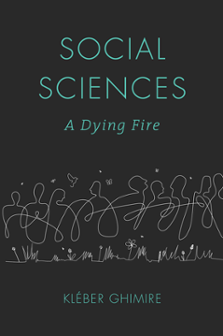
Prelims
ISBN: 978-1-80117-042-0, eISBN: 978-1-80117-041-3
Publication date: 3 June 2021
Citation
Ghimire, K. (2021), "Prelims", Social Sciences: A Dying Fire, Emerald Publishing Limited, Leeds, pp. i-vii. https://doi.org/10.1108/978-1-80117-041-320211008
Publisher
:Emerald Publishing Limited
Copyright © 2021 Kléber Ghimire
Half Title Page
Social Sciences
Title Page
Social Sciences: A Dying Fire
BY
Kléber Ghimire

United Kingdom – North America – Japan – India – Malaysia – China
Copyright Page
Emerald Publishing Limited
Howard House, Wagon Lane, Bingley BD16 1WA, UK
First edition 2021
© 2021 Kléber Ghimire. Published under exclusive license by Emerald Publishing Limited.
Reprints and permissions service
Contact: permissions@emeraldinsight.com
No part of this book may be reproduced, stored in a retrieval system, transmitted in any form or by any means electronic, mechanical, photocopying, recording or otherwise without either the prior written permission of the publisher or a licence permitting restricted copying issued in the UK by The Copyright Licensing Agency and in the USA by The Copyright Clearance Center. Any opinions expressed in the chapters are those of the authors. Whilst Emerald makes every effort to ensure the quality and accuracy of its content, Emerald makes no representation implied or otherwise, as to the chapters’ suitability and application and disclaims any warranties, express or implied, to their use.
British Library Cataloguing in Publication Data
A catalogue record for this book is available from the British Library
ISBN: 978-1-80117-042-0 (Print)
ISBN: 978-1-80117-041-3 (Online)
ISBN: 978-1-80117-043-7 (Epub)


Contents
| Praise for Social Sciences: A Dying Fire | vii | |
| Chapter 1: Introducing the Key Elements of Crisis | 1 | |
| The Pretension of Being a ‘Science’ and its Consequences | 5 | |
| Fragmentation of Disciplines | 12 | |
| The Ignoring of Wider Trajectories and Thought | 21 | |
| The Idea of Human Uniqueness and Primacy | 29 | |
| Chapter 2: Efforts to Reflect on Factors Intrinsic to Crisis | 37 | |
| Social Sciences’ Institutional Building after the Second World War | 38 | |
| Debates on Indigenisation of Social Sciences | 43 | |
| More Recent Writings or Initiatives | 50 | |
| Chapter 3: Structural as Well as More Contemporary Problems Facing the Social Sciences in Europe and North America | 63 | |
| The Burden of Empiricism | 64 | |
| The Problematic Role of Expertise | 71 | |
| The University as an Economic Enterprise | 79 | |
| Chapter 4: Asia as a Centre of New Impulsion in Social Sciences’ Renovations? | 89 | |
| Modernisation Processes and the Social Sciences | 92 | |
| Societal Investment in Education | 100 | |
| The Question of Quality | 107 | |
| What about the Japanese Experience? | 114 | |
| Chapter 5: A New Context of Marginalisation of Social and Human Studies | 123 | |
| Shifting Discourse on Knowledge | 123 | |
| Ranking of Universities and its Effects | 130 | |
| The Pretence of Internationalisation | 139 | |
| Chapter 6: Concluding Discussion | 147 | |
| A Crisis of Hydra? | 147 | |
| Thinking About New Horizons | 152 | |
| Bibliography | 169 | |
| Index | 175 | |
Praise for Social Sciences: A Dying Fire
‘The social sciences are caught in an internecine web of internal debates, making the enterprise largely irrelevant to the vast majority of human life. This fact is brilliantly captured in A Dying Fire, in which Professor Kléber Ghimire insightfully describes the causes and consequences of the social sciences’ collective navel-gazing. Yet he does so not as a radical, eclectic project, but as an attempt to generate critical thinking essential to ensure continued relevance of these fields of study. De-centering Europe and North America is a vital step toward re-centering the value of the social sciences.’
Matthew F. Filner, Professor of Political Science and Faculty Association President, Metropolitan State University, Minnesota, USA.
‘This book digs deep in the history of social sciences and critically assesses their present uncertain positions. Its’ especially important contributions – and cannot be found easily elsewhere – are the reflections and analysis of the social sciences in Asian universities.’
Vesselin Popovski, Professor of Law and Vice Dean, O.P. Jindal Global University, Haryana, India.
‘This is a highly original interdisciplinary critique of social sciences. The book is most interesting and important for academics, students or anyone who want to rethink about the current nature of social sciences’ learning.’
Xiaoyuan Shang, Professor of Social Policy, Beijing Normal University, China.
‘This book persuasively explains why the social sciences should move beyond the narrow ideas of scientism, empiricism and professionalism toward a broader concept of learning and comprehensive thinking, and further conveys astoundingly deep knowledge about the commonalities and differences in the notion of learnedness and educational traditions of Western and Asian societies.’
Jin-Wook Shin, Professor of Sociology, Chung-Ang University, Seoul, South Korea.
- Prelims
- Chapter 1: Introducing the Key Elements of Crisis
- Chapter 2: Efforts to Reflect on Factors Intrinsic to Crisis
- Chapter 3: Structural as Well as More Contemporary Problems Facing the Social Sciences in Europe and North America
- Chapter 4: Asia as a Centre of New Impulsion in Social Sciences’ Renovations?
- Chapter 5: A New Context of Marginalisation of Social and Human Studies
- Chapter 6: Concluding Discussion
- Bibliography
- Index